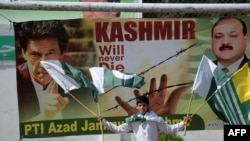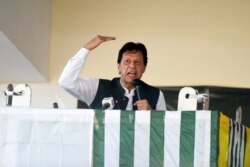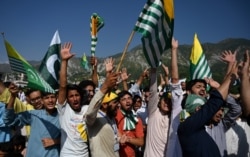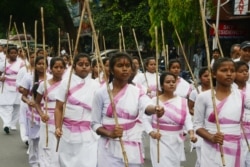Pakistani Prime Minister Imran Khan has warned that India's recent actions concerning the disputed region of Kashmir will give rise to extremism among Muslims in India and around the world.
"When you marginalize human beings, when you push them to the wall, they become radicalized," Khan said Friday as he addressed a rally of thousands in Muzaffarabad, the capital of Pakistan-administered Kashmir.
He also indirectly criticized some Muslim governments that either openly supported Indian actions in Kashmir or hardly said anything at all.
"Some Muslim governments are quiet due to their trade relations with India. But one-and-a-quarter-billion Muslims are watching. Some of them will be pushed to extremism; some of them will also pick up guns," Khan warned.
Kashmir is India's only Muslim-majority region.
In August, after India changed its laws on Kashmir, ending the territory's special status and depriving the region of relative autonomy, the ambassador of the United Arab Emirates in Delhi issued a statement in favor of the move.
"We expect that the changes would improve social justice and security and confidence of the people in the local governance and will encourage further stability and peace," said Ambassador Ahmad Al Banna.
Controversial crackdown
Kashmir has been claimed by both Pakistan and India since the two countries gained independence from Britain in 1947. Both countries administer parts of the region, with a so-called Line of Control acting as the de-facto border. In both countries, Kashmir held a special status, with relative autonomy, its own flags, and its own prime ministers until the Indian move last month.
To keep the population from carrying out wide-scale protests, India has imposed a curfew in most of the region, suspended cellphone service, and banned newspapers or television news broadcasts.
Citing Indian government data, Reuters news agency recently reported there have been at least 4,000 arrests and detentions. Human rights organizations have strongly criticized the curfew, ongoing for about six weeks, saying it has led to severe shortages of food and medicines.
The communication blackout has made it difficult for journalists or independent human rights activists to assess the situation in the area, but stories of alleged torture involving the security agencies have emerged.
A BBC story alleged torture so severe that the victims claimed they wanted to die. Security agencies in India have repeatedly rejected such allegations as "baseless."
India's argument
India's government claims the change in status will bring stability and economic prosperity to the region by opening up investment opportunities.
"The decision removes impediments to the enjoyment of civil, political, social, economic and cultural rights of our citizens in Jammu & Kashmir and Ladakh, especially those dealing with women, children and disadvantaged sections of our society in that region," India told the United Nations Human Rights Council in Geneva this past week.
In an interview in Brussels with U.S. media outlet Politico, Indian External Affairs Minister Subrahmanyam Jaishankar said, "Internet and telephone outages were needed to stop the activation of 'terrorist assets' and to prevent people who are doing violence to contact each other."
'Ethnic cleansing'
Pakistani Prime Minister Khan has compared India's actions to those of Hitler in Nazi Germany during World War Two. Khan also drew a comparison to fascist Italian leader Benito Mussolini, Hitler's World War Two ally.
"RSS founders considered Hitler and Mussolini role models and wanted to carry out a similar ethnic cleansing of Muslims," he said, pointing to Rashtriya Swayamsevak Sangh, a right-wing, Hindu-nationalist party that has close ideological and organizational links to the current Indian ruling party Bharatiya Janata Party (BJP).
Khan pledged to raise the issue in his U.N. General Assembly speech later this month in New York.
Not all Kashmiris were happy with Pakistan's government or Khan.
"Imran Khan sold Kashmir during his [recent] U.S. visit. Things have been finalized on the division of Kashmir," said Qazi Anwar, a 55-year-old businessman in Muzaffarabad.
Another man, Atta Ullah Butt, who had come to attend Khan's rally from 50 kilometers away, said he was unhappy with the actions of the Pakistani prime minister so far.
"Imran Khan announced a month ago that he will be Kashmir's ambassador; however, he has not visited a single country to lobby on the Kashmir issue in all this time," he said.
'Hope in Imran Khan'
Others, however, said they hoped Khan's efforts at the UNGA will help their cause.
"We have hope in Imran Khan. He will make efforts for liberation of Kashmir," said Liaqat Ali Awan, a 45-year-old jeweler from border town Chinari.
"Narendra Modi, can you hold a similar rally in Srinagar, the capital of Indian Kashmir?" said Pakistani Federal Minister for Foreign Affairs Shah Mahmood Qureshi, challenging the Indian prime minister.
"If you think your decision is popular, remove the curfew and then see what happens."
"Next week in New York, I am going to the U.N. General Assembly and will not disappoint Kashmiris," Qureshi said. "I will take a stand so strong that it hasn't been taken before. I will talk about Kashmir on all international media."







